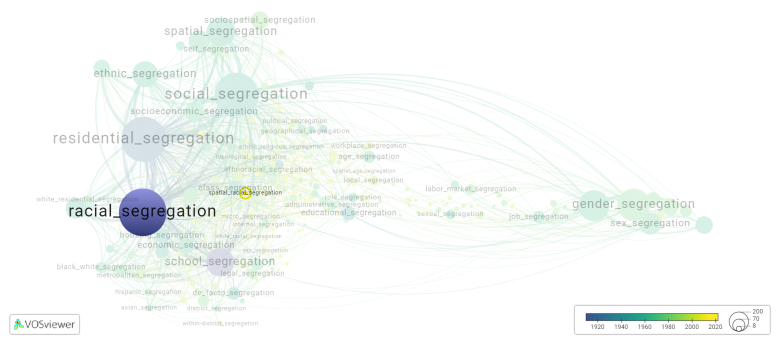Spatial racial segregation: Difference between revisions
(Creating page) |
(Creating page) |
||
| Line 6: | Line 6: | ||
Spatial racial segregation refers to the physical separation of different racial groups within a specific geographical area. This occurs when racial or ethnic minorities are concentrated in particular neighborhoods or regions, while others groups are concentrated in different areas. Spatial racial segregation can occur for various reasons, including discrimination, economic disparities, historical factors, and social prejudices. It can have significant social and economic implications, contributing to inequalities in access to resources, education, healthcare, and employment opportunities. Efforts to address spatial racial segregation often involve policies and initiatives focused on promoting integration and equity. | Spatial racial segregation refers to the physical separation of different racial groups within a specific geographical area. This occurs when racial or ethnic minorities are concentrated in particular neighborhoods or regions, while others groups are concentrated in different areas. Spatial racial segregation can occur for various reasons, including discrimination, economic disparities, historical factors, and social prejudices. It can have significant social and economic implications, contributing to inequalities in access to resources, education, healthcare, and employment opportunities. Efforts to address spatial racial segregation often involve policies and initiatives focused on promoting integration and equity. | ||
===== Synonyms ===== | ===== Synonyms ===== | ||
The following terms are synonymous with: | The following terms are synonymous with spatial racial segregation: | ||
racial spatial segregation. | racial spatial segregation. | ||
| Line 18: | Line 18: | ||
[[File:spatial_racial_segregation.png|780x780px]] | [[File:spatial_racial_segregation.png|780x780px]] | ||
This visualization is based on the study [[How_to_cite_Segregation_Wiki| The Multidisciplinary Landscape of Segregation Research]]. | |||
For the complete network of | For the complete network of interrelated segregation forms, please refer to: | ||
* | * [https://tinyurl.com/2235lkhw First year of publication] | ||
* | * [https://tinyurl.com/2d8wg5n3 Louvain clusters] | ||
* | * [https://tinyurl.com/223udk5r Betweenness centrality] | ||
* | * [https://tinyurl.com/244d8unz Disciplines in which segregation forms first emerged (Scopus database).] | ||
==References== | ==References== | ||
==Notes== | ==Notes== | ||
Revision as of 07:49, 10 October 2024
Date and country of first publication[1]
2018
South Africa
Definition
Spatial racial segregation refers to the physical separation of different racial groups within a specific geographical area. This occurs when racial or ethnic minorities are concentrated in particular neighborhoods or regions, while others groups are concentrated in different areas. Spatial racial segregation can occur for various reasons, including discrimination, economic disparities, historical factors, and social prejudices. It can have significant social and economic implications, contributing to inequalities in access to resources, education, healthcare, and employment opportunities. Efforts to address spatial racial segregation often involve policies and initiatives focused on promoting integration and equity.
Synonyms
The following terms are synonymous with spatial racial segregation:
racial spatial segregation.
References and literature addressing this segregation form under these synonymous terms can be found below.
See also
Related segregation forms
Spatial racial segregation is frequently discussed in the literature with the following segregation forms:
racial segregation, racial residential segregation, spatial segregation

This visualization is based on the study The Multidisciplinary Landscape of Segregation Research.
For the complete network of interrelated segregation forms, please refer to:
References
Notes
- ↑ Date and country of first publication as informed by the Scopus database (December 2023).
At its current state, this definition has been generated by a Large Language Model (LLM) so far without review by an independent researcher or a member of the curating team of segregation experts that keep the Segregation Wiki online. While we strive for accuracy, we cannot guarantee its reliability, completeness and timeliness. Please use this content with caution and verify information as needed. Also, feel free to improve on the definition as you see fit, including the use of references and other informational resources. We value your input in enhancing the quality and accuracy of the definitions of segregation forms collectively offered in the Segregation Wiki ©.
Spatial racial segregation appears in the following literature
Breetzke G.D. (2018). The concentration of urban crime in space by race: evidence from South Africa. Urban Geography, 39(8), 1195-1220. Routledge.https://doi.org/10.1080/02723638.2018.1440127
Tewolde A.I. (202). Experiencing de facto Racial Residential Segregation in Urban South Africa: An African Refugee's Auto ethnography1. Urbanities, 10(2), 109-123. Il Denaro Group.https://doi.org/
Nardone A., Chiang J., Corburn J. (202). Historic Redlining and Urban Health Today in U.S. Cities. Environmental Justice, 13(4), 109-119. Mary Ann Liebert Inc..https://doi.org/10.1089/env.2020.0011
Connolly J.J.T. (2021). A COMMUNITY FIGHTS FOR ITS HEALTH WHILE BATTLING IMPENDING GENTRIFICATION: Bayview Hunters Point, San Francisco. The Green City and Social Injustice: 21 Tales from North America and Europe, 111-122. Taylor and Francis.https://doi.org/10.4324/9781003183273-10
Connolly J.J.T., Lira M. (2021). A NEW SHADE OF GREEN: From historic environmental inequalities over green amenities to exclusive green growth in Austin. The Green City and Social Injustice: 21 Tales from North America and Europe, 148-159. Taylor and Francis.https://doi.org/10.4324/9781003183273-14
Triguero-Mas M., Kellogg W.A. (2021). IS CLEVELAND’S VISION OF A “GREEN CITY ON A BLUE LAKE” A PATH FOR SOCIAL EQUITY OR GREEN GENTRIFICATION?. The Green City and Social Injustice: 21 Tales from North America and Europe, 75-87. Taylor and Francis.https://doi.org/10.4324/9781003183273-7
